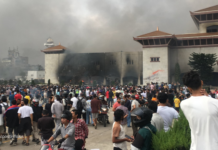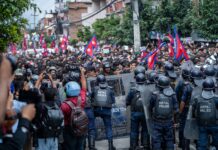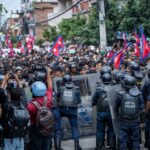ABSTRACT
A group of concerned academics and practitioners in the field of policing in the East take on the controversial and affectively heated topic of “terrorism.” Various views are expressed, with some attempt, more or less, to incorporate what a fearist perspective, and a philosophy of fearism can offer. The focus of the dialogue is to express views in a respectful way, keeping an open mind and fearlessness alive in doing so. Fear is seen as the source of terrorism, and that begins a core premise for further dialogue and developments. Fisher, from the West, offers a summary and concluding remarks, and shows there is a growing literature on the topic of terrorism from a fearism perspective. Now, the challenge is to be patient, and inquiring, and establish good communications across disciplines and from theory to practice, in order to build a potential unifying view of global “terrorism” and how to best intervene, if not resolve it.
INTRODUCTION
Fisher and Subba (2016) crafted the first publication on “terrorism” based on a philosophy of fearism [1], by which fearology is largely informed, and yet there is still a large ‘gap’ in discussions on terrorism that the dialogue below attempts to fill [2].

Every situation in life raises a critical question. When I (Kalu), a budding fearologist,was studying Fisher’s (2018) recent published article, “The Fourth Stage of the Fearologist,”[3] I began to ruminate on so many things in my mind. I came to realize that the rightful onus of guiding the State and analyzing the “terrorist attacks” in the world today lies largely in the hands of “Fearologists,” yet these new professionals are yet fully developed for the task and are still largely unknown by society in general.
The task of the fearologist is spelled out when Fisher (2018)wrote,
I cannot myself, see what theory of “fear” they (the war-mongering US leaders) utilize to make their choices, nor inform the public of such theoretical framework and assumptions that go with it. In do not see them inviting us (as academics or citizens) to examine (critically) their ‘fear’ policies and pedagogy, nor do they declare whom they have hired as their ‘fear’ consultants. Do you? (p. 6)
This mind blowing statement shows how the fearologists are neglected on one hand, which must have discouraged them from doing some ‘terrocriticism’ or ‘fearanalysis’ [4] of the terrorists attack. The global activities of the many terrorists possess a great challenge on the shoulders of the fearologists, not just because the subject of terrorism is so emotion-laden and causes fearfulness but because, it triggers our apprehension or outright fear for our own life, the life of our family and friends, which all affects or stirs our distinctive moral emotions. Building on this backdrop, it is not out of place to affirm that terrorism causes “fear-culture.”
Thus, let us look at “terrorism” from the fearism spectrum, so as to carefully dissect it for our present society that is challenged with this situation. This discussion will potentially help States to manage terrorism, especially when it comes to knowing which violence is tagged terrorism, how to best be involved in counterterrorism, and how the terrorist uses fear to manipulate the society.
THE TERRORISM DIALOGUE

Osinakachi Akuma Kalu: Fear is infectious, and new digital-mediated technologies of communication have made it so. The human person who is a “ens socialis”- a social being that always interrelates and shares experiences. This very ontological foundation makes it easy for the contamination by fear.
In recent time, there are lots of terrorist operations and attempts and successful attacks in different parts of the world– State and Non-State Terrorism (Insurgency). Some of these operations are very confusing as it becomes normally said, that one’s “freedom fighter” is another one’s “terrorist.”In my country Nigeria, the recent hyper-terrorist attack from two world class terrorist groups (Boko Haram and Fulani Herdsmen) that are among the top four dangerous terrorist groups in the world, is making Nigeria the 3rd most terrorized country behind Iraq and Afghanistan, according to the 2017 Global Terrorism Index (GTI).. One needs not to ask if the people of Nigeria are living in fear since they do not know the next line of action of the Fulani Herdsmen, whom the government is paying little or no attention to.
Having said that, since definition is some sort of setting parameter and philosophers, sociologists, political experts, and military personnel have their own way of looking at terrorism, it is pertinent that we define ‘terrorism’ from a fearist perspective. For me, “terrorism is any attempt or use of a violent act (against innocent people) characterized by fear, engineered by an individual, group or state to distract any governing body, making them to do what they wouldn’t have done”.
Mehzbeen Sadriwala – I would submit by saying one generates terror by power of fear.
What is terror or terrorism?It’s not just about attacking or destroying any nation but as a whole terrorism is a state-of-the-mind, which one institution tries to build. This fear of terrorism is so powerful that it persists generation to generation.
Once built/created this terror by tool of fear it will prevail and will long go on historically.
Fear of losing one’s self, fear of losing home, fear of losing loved ones and a growing list can describe this. This fear makes people to become slaves.
How to overcome this fearism of terrorism is the prevailing question of time?
Let’s pray unitedly for the peace to prevail and make nations healthy in every way.
- Maria Kumar: Nicely put when you said that the onus of guiding the state as far as terrorism is concerned, lies in the hands of fearologists. Contribution of the founders like Fisher and Subba in this respect is nonpareil, for they have taken suo moto responsibility and are relentlessly engaged for the cause.
What you said is very true that the subject of terrorism triggers our apprehension or outright fear for our own life, the lives of our own family and friends which affect or stir our distinctive moral emotions.
Terror in a way is nothing but fear amplified. Ultimately, what makes a terrorist to wage his kind of ruthless and notorious war against the society? To my mind, one of the main reasons appears to lie in economics, a la Marxian theory of economic determinism. As one of the economists professed, poverty anywhere in the world is a threat to prosperity everywhere in the world. It is not uncommon to see that some, if not many, get disgruntled to avenge the society because of their poverty stricken status, born or made to. As quoted by scholars, there’s no one who is more dangerous than the one who has nothing to lose.
Persons of such background are likely to form a major chunk of terrorist cadres, who tend to use any nefarious means by hook or crook to achieve their objectives.Coming to the “terrorism” definition part, I would like to propose for further expansion in order to cover more ingredients like:
-attempt, abetment or use of tactics, strategies, actions
-with intent to intimidate, threaten, overawe
-probable or actual victims being any person, groups, government
-perpetrator of terrorism using handheld, mechanical, explosive, nuclear, biological, chemical weapons
-with or without the aid of digital technology
-in such an unethical manner as to cause death, injury, danger, damage, destruction
-associated with fear, alarm or anxiety of extraordinary proportions…..etc.
Therefore, one of the efforts of fearologists may be to explore the modalities as to how the potential perpetrators of terrorism could be identified basing upon such criteria as deemed relevant for prognosis so that steps to thwart the same could be taken before hand.
Desh Subba:It is difficult to define “terrorism” in standard definition, although, particularly this was more popular to do so after 2001, September 11. Al Qaeda attacked Twin Towers of New York on this date. Al Qaeda was consideredan extremist Muslim religious group. Talal Asad postcolonist author and some others asked the question: Is it justified to define Al Qaeda only as religious organization? (see Theory talk Sanjeev Upreti 2068 BS)
Same question can be put to Boko Haram and Fulani Herdsmen, can we define as only Terrorist organizations?
Terrorism is one of the biggest problems of the present world. Terrorists have their many beliefs. Political, religious and economic. It is thought they have been dominating racially, economically and religiously. According to them they are protecting. If not protect, their existence may be lost. As much as weapons they also use their knowledge as power to protect.
Human nature, cannot stay without any activities; when they do activities, basically, they are concerned with safety for life. This means, as fearologists, we keep life in the centre of activities. At any cost, we try to save life. When individual, community, race, religion save it that may help some but often it sometimes hampers others. Hampered people do vice versa. Slowly it births fear for two, or multiple communities and enemies grow. Fear of fear game begins among groups.
Present of terrorism creates terrible environments in countries and around the world. First these activities started with protection goals, and later mixed in with ego, prestige, ideological beliefs. These ego, prestige, and ideological beliefs need to be protected again. And a series of new protectable items come in the front of motivations. It makes situations more worse. All these are happening because fear of lost identification of self, culture, language, religion, race, nation.
According to mass peoples, terrorism is a misuse of fear. We understand they are taking a wrong decision. Some critics says, it’s not only war of weapons, inside attacks, there is pain of language, culture, race, religion etc. This context, beyond terrorism acts, is the part that isoften ignored. We fearologists with a fearist lens look through Fearism perspectives. And, we find fear is the main reason behind these activities.
Antiterrorist activity needs to create ways to minimize fear situations. This meansthat governments have responsibility to give them secure life. When they reduce fear, they reduce terrorist mobility. When both sides and multi-groups in conflict manage their fear well, the entire environment will be more at peace. This peace gifts happy, prosperity individuals to a nation. Situations of Nigerian terrorism is another case, more or less the same principle would apply.
Osinakachi Akuma Kalu: Apart from bombing, terrorists sometimes destroy peoples farms, kidnapping or abducting people, and often times demand for ransom. Stressing that if their demand is not reached, they will kill the kidnapped or abducted persons. This fear of death, often make the society to be in great tension. This view point is applicable to non-state terrorism (insurgency). On the other hand, in state terrorism or even non-state terrorism, the terrorists may decide to pose fear by threatening to destroy one of the state’s sources of income. What advice can the fearologist give, especially when human lives are involved in the bargain?
Desh Subba:First we have to recognize the source of their terrorism activities. Who are actually doing and/or sponsoring terrorists or those doing the threatening are not always the same case. Bombing, destroying peoples farms, kidnapping or abducting are coming from all different sources. Although, their common goal is to spread terror to people, specific motivations behind it come from many different reasons. Somebody may have a personalenemy, ego, jealousy, anger. Kidnapping and asking ransom is the same. They believe that without terror or threat, they couldn’t meet goal.
Fear is the easiest most powerful way to enforce people to do something, not that it is always ethical to do so. The fearologists are like a special task force to solve these problems. We first need to find macro level sources, and then step by step solve it with a fearist lens. Sometimes, there may be cases, where it is impossible to do in a holistic way.
Political or religious terrorists come from a deep identity fear. How can we address their demand? The state has to convince them and communicate. If state doesn’t listen to demands, then the groups have no choice but to carry weapons. Once they start carrying weapons, it’s difficult to surrender. In my country 20 year before, the communist party put 52 points as a demand to congress government. Government ignored their demands, because communist had no weapons that time. Government did not listen them and they thus started a civil war for almost 12 year,it was brutal killing thousands of soldiers, police and public. Communists became powerful and captured many police posts and villages. Later the government invited terrorist in dialogue. After a long debate, they made agreements. If 20 years before the government welcomed them and sat in dialogue, thousands of people’s lives would have been saved. Most other countries have these same dynamics. So we need to listen to demands of opposite parties. It also may help to boycott terrorism as a legitimate form of negotiating power. But all sides have to agree or it won’t work.
Osinakachi Akuma Kalu: LIFE is the CHIEF VALUE. Terrorists uses FEAR OF DEATH as a barometer to carry out their functions. However, if no ransom is paid, the terrorists will stop their operations. America, for example, don’t negotiate with terrorists. Negotiating with them is more or less making them relevant, popular and event of the moment.
| The terrorist has no respect for human life, and as such should be treated as NOTHING. If every nation can conquer the fear of death, terrorism will have no place in our time. The question now is, who are going to be the victims of sacrifice before the terrorists gets tired of their actions? I think the whole world should go back to the meaning of the “Ontological Foundation of Human Dignity” and the collectively fight against this “Societal Malady” – FEAR. |
|
| Furgeli Sherpa:Terrorism and anti-terrorism are different but related with each other. Terrorism creates counterterrorism. Terrorists play with the sentiment of the people. They enjoy blackmailing the people for their personal benefit. It is not an easy job to find the terrorists, fix the terrorists, and finish the terrorists. Antiterrorism operations are the operations of winning hearts and minds of the people. People support the terrorists and are either in fear or in fearlessness.
Propaganda, rumors, sabotage, espionage, subversion etc. are the main tactics of terrorists. Terrorists create fear in the public and create for the environment in favor of them. Terrorism is, in the broadest sense, the use of intentionally indiscriminate violence as a means to create terror or fear, and to achieve a financial, political, religious or ideological aim. Decapitation, Negotiation, Success, Failure, Repression and Reorientation are ways to deal with terrorism. Counterterrorism incorporates the practice, military tactics, techniques, and strategy that government, military, law enforcement, business, and intelligence agencies use to combat or prevent terrorism. Counterterrorism strategies include attempts to counter financing of terrorism. Military and non-military aims and ways of settlement of the terrorism is actually a way to create the fearlessness. |
A Few Concluding Thoughts by R. Michael Fisher
It is heartening to see more people joining the fearism conversation as the above dialogue indicates. They come from varied backgrounds, and that is a good sign for a healthy discussion that may bring in many perspectives, even with disagreements, and not just one view on the topic of “terrorism.” If anything strikes me as generally valid, it is that terrorism in all its different forms are not going to be solved by one or two lenses of analysis or a few broad brush interventions. We have to think with a new consciousness, so we don’t reproduce the very consciousness that created the problem in the first place, as Albert Einstein often said.We require a holistic-integral approach and one that foregrounds the nature and role of fear(ism) as core to understanding terrorism. In Fisher (2016) I wrote “Fearism-t [toxic form] is an ideology designed to keep us both ignore-ant and arrogant regarding fear (and ‘fear’)” [5] and, in regards to the dialogue herein, I could just as well have added ‘regarding terror and terrorism.’ The simple sounding, yet profound offering to counter the fearism-t, is as Subba suggested in the dialogue above, and that is for authorities like governments to deal with terrorism by overall a strategic plan, because “When they reduce fear, they reduce terrorist mobility [i.e., activity].” Easier said than done, but a great guidepost and ethical position to adopt.
This complex time of increasing terrorist activity, and its many forms, tells me that the best starting point for fresh dialogues on the topic must begin with open-mindedness, a sense of fearlessness, and with creativity and innovation. The above dialogue I believe has much to offer because it has many of these qualities. This is no time to be ignoring multiple views or arrogantly assuming we already know everything we need to know about terror(ism)—and, likewise with fear(ism).
A fearological theory on “terrorism” has not yet been discussed nearly enough, though these dialogues are a great start to sorting through what it means to take a “fearist perspective”(e.g., Subba, 2014) [6] on a controversial topic like terrorism. Bringing forth the equally important “integral fearlessness paradigm” (e.g., Fisher, 2006), lens, and perspective [7] can also add to these dialogues but that requires people also study them and have some background. It takes time to learn these “tools.” I like that there are philosophers and practitioners involved in this dialogue, and that there is no need for any of us to be “experts” on the topic of terrorism or on the philosophy of fearism or fearology. The teaching and learning mix is a good place to begin to sort out our views and bounce them off each other. All of us can play learners and teachers, in a variable dialectic way. Which, is not to say we are all merely flat and “equal” on some kind of abstraction of pluralism and relativism of knowledge. For example, from the dialogue, it seems all of us could agree with the basic fearological premise, stated by Kumar: “Terror in a way is nothing but fear amplified.”Surprisingly, not everyone would see it that way. The ‘bigger’ reality of terrorism and how to solve it is beyond premises and relativity of knowledge as well.
We do require specialist fearological theory and vocabulary and we require distinct expertise as well. We require empirical research too. Expertise doesn’t have to be brought down on us or “the people” with a hammer and domination. Expertise can be generous, welcoming and actively invitational and inter-relational as well. I think all the participants above in this dialogue show that spirit of cooperative inquiry. I also think we will need more than dialogues to get down to the nitty-gritty of analysis and interventions—which, the fearologist requires and as do those who are not fearologists listening to fearologists also require.
We are going to have to remain in close relationship to the virtue of patience, as well. Difficult problems have difficult solutions, has been my experience. Big problems don’t usually resolve overnight. Yet, we also ought not allow ourselves to fall into a pessimistic or contrite realism and skepticism without a balance of healthy idealism. To me, fearology and fearism are idealistic and yet pragmatic. One is not better than the other as a strategy and position of values. They are complementary, if we regard them both as sacred to the ‘best’ inquiry we can offer. I appreciate greatly in this dialogue that the philosophers and practitioners, not always easy to distinguish either, are listening to each other with respect.
If I have a critical challenge to this kind of dialogue, it is that we acknowledge there will be an increasing resistance growing, as well as some new acceptance, to the fearologist and to fearism discourse and its offerings. There is already some signs of rejection of “fearism” coming from those with vested professional and academic interests to control the hegemony of discourse on “terrorism” by terrorologists and/or criminologists and those from Security Studies fields (e.g., Colarik, 2006, p. xiv; cited in Fisher, 2016, p. 18) [8]. We cannot be naive to this criticism and competition. We’ll have to learn how to talk to our ‘enemies’ on both sides, those who are “terrorists” and those who are trying to counter them. I believe, that fearologists have to offer a new view of analysis on terror(ism) and fear(ism) together, and not be too easily lured into old prior discourses that want to label “terrorist” in only one context or perspective, that is, from the ‘norm’ perspective of authority and status and power. I prefer a critical theory perspective to the ‘norm’ only perspective.
We have to analyze the dynamics of how systemic terrorism arrives in the first place and how even the most democratic “stable states” are prone to using terrorism tactics, as ‘normal,’ punishment on all kinds of people, including their heavily-funded counter-terrorism agendas that taxpayers are paying for without knowing always what is going on with our military and police and FBI agencies etc. No one, in my view, is completely innocent from somehow being a colluding participant in the organizations of “terrorism” and horrific crimes against humanity and other species on this planet. That’s the critical integral-holistic perspective on terrorism that I believe is worth exploring.
The fearologists’ roles are diverse, but one of them has to be examining how fear spreads to become terror, and how the cycle of fear/terror is reproduced in systems, not just in small “terrorist groups.” There is no simple linear causality. When Kalu opened this dialogue with “terrorism causes ‘fear-culture’” I trust the partial and easy truth that may represent; however, it is too linear-causal for my liking as a systems and complexity thinker and fearologist. It is difficult to pin down one linear cause and effect when you look at the ‘bigger picture’ of dynamics going on in how human’s have also created a fear-culture or “culture of fear” that induces terrorism in a dialectical way, not merely linear-causal. This systems approach, in the long-run will improve how we analyze and intervene.
We have to look at how fear creates fear because we are ontologically a social creature, as Kalu said earlier, because it is “infectious” and shows up in subtle or dramatic forms. “Terrorism,” as we, and the mass media and government leaders, commonly understand it from a ‘norm’ perspective in society, is merely the extreme visible dramatic symptom-expression of an insidious and more invisible ideology of fearism-t and suffering. In Fisher & Subba (2016) we lay out eight preliminary recommendations for dealing with terrorism. I hope future dialogues on terrorism like the above will engage those recommendations at some level, as they are not done so in the above dialogue. One of the things in those recommendations, but also my own experiences have shown, is that we have to learn to deal with “resistance” actions on both sides of the fence of authority-rebel dynamic patterns and archetypes in systems. Kalu referred to that similarly above in the problematic confusion of terms, where “one’s ‘freedom fighter’ is another one’s ‘terrorist.’”
I’m curious to trouble and deconstruct thoughts from the dialogue above, like Kumar’s citing a commonly accepted phrase re: terrorists or other criminals: “there’s no one who is more dangerous than the one who has nothing to lose.” I think all humans, no matter what, at some level have their absolute ontological “resistance” to poverty to oppression/domination to lose! Some would say this is “freedom” that I am talking about. Arguably, even if outer freedom is gone, humans, like all living things, keep a spirit of fearlessness a priori in principle alive inside. The generic common sense truth Kumar re-states is partial but not all the truth.Anyways, fearology can provide a new way to analyze “resistance” from multiple perspectives and learn better how to work with it so that dignity, respect and fearlessness can be a gifted possibility for all, even those who commit crimes called “terrorism” by some. We have to inhibit “freedom” from those who abuse it. Law and security forces in general are slow yet in understanding this nature of resistance that I am speaking to. And, they are also slow in understanding what philosophy of fearism and fearlessness offers. We have a lot of work to do to communicate.
I rest my, perhaps,controversial fearological case.I invite all to give their feedback and views on this entire dialogue as well as on my views, as I have come in at the end to add my concluding remarks. Thanks Mr. Kalu for inviting me to join in.
BRIEF BIO OF CONTRIBUTORS
OSINAKACHI AKUMA KALU (osinakachikaluakuma@gmail.com)
Igbo by birth is from the Eastern part of Nigeria. He is Philosopher, Administrator and a Fearologist. As a Claretian Institute of Philosophy trained philosopher, a schooled Fearologist at the Fearism Study Center Dharan, Nepal and Diploma graduate in Business Administration and Management at Federal Polytechnic Nekede Owerri. He is the present leader of Fearism studies in Africa. In the Fearism milieu, he is the disciple of Desh Subba (Nepal) and R. Michael Fisher (Canada). Nevertheless, he is also the Founder of an academic group known as The Penlords and presently the president of the group. He is an author (Conquering the Beast Fear: A Philosophical Cum Psychological Approach and The First Stage of The Fearologist) and a motivational speaker
DESH SUBBA (fearism@gmail.com)
Is a philosopher, poet, writer, and founder of the Fearism Study Center (Nepal) and leading expert on the philosophy of fearism. He is a Nepali Scholar who lives at 215, Yuk Ping House, Long Ping Estate, Yuen Long, New Territories, Hong Kong.
Education: Master in business administration, Writing field: Philosophy of Fearism, Novels and Poems, Published Novel Books: Four novels, Doshi Karm 2050 B.S, Apman 2052 B.S., Sahid 2056 B.S., Aadibashi 2064 B.S., Philosophical Books: Philosophy of Fearism 2014 (English and Nepalese), It is translating in Hindi, Assamis and Burmese, Philosophy of Fearism- a First East-West dialogue 2016- English (co-author with Dr. R. Michael Fisher), Tribesmen’s Journey to Fearless (Novel based on Fearism)
- MICHAEL FISHER (r.michaelfisher52@gmail.com)
Is a Canadian philosopher and fearologist, founder of the In Search of Fearlessness Project (1989-) and other alternative higher education organizations. He has a masters and doctorate levels degrees in Counseling Psychology, Adult Education and Curriculum and Instruction Design. He is an author, private consultant and educator living in Calgary, AB, Canada.
- MEHZBEEN SADRIWALA(mehzbeen.kaizen@gmail.com)
Is an assistant professor Department of English, M.V. Shramjeevi Collage (Affiliate of Rajasthan University) Udaipur India. She is an author of different books and articles of national and international repute
FURGELI SHERPA(phoorgelee@gmail.com)
Is from Jiri municipality Yaloong, Dolakha, Nepal. He has masters in Humanities and Management. He is a member of armed police force, Nepal. And has recently taught the basics of the philosophy of fearism to the UN peace-keeping forces in Sudan.
- MARIA KUMAR (b.mariakumar@gmail.com)
Born on 5th April 1958, B. Maria Kumar studied biology at pre-graduation level, chemistry in graduation and business management and philosophy in post-graduation at Vijayawada, Guntur and Hyderabad (India) respectively. Joined Indian Police Service in 1985, he served in central India holding various positions in law enforcement and is presently working as Director General at Bhopal. Interested in literature, and has written books in his mother tongue Telugu and also in English. Some of his published titles are in Amazon online store.
Notes & References
- Fisher, R. M., & Subba, D. (2016). Terrorism: A guide to fearful times based on a philosophy of fearism. Technical Paper No. 57. Carbondale, IL: In Search of Fearlessness Research Institute.
- The other recently published source for some limited discussion on terrorism, from the perspective of fearism can be found in Fisher, R. M., Kumar, B. M. & Subba, D. (2018). Fearcriminalysis dialogue series (Pt. 1-3). Go to:https://fearlessnessmovement.ning.com/blog/fearcriminalysis-dialogue-series-pt-1-subba-kumar-fisher
- Fisher, R. M. (2018). The fourth stage of the fearologist. Technical Paper No. 73. Calgary, AB: In Search of Fearlessness Research Institute.
- See Fisher, R. M. (2017). Fearanalysis and ecocriticism in the light of terrorcriticism. Technical Paper No. 69. Calgary, AB: In Search of Fearlesness Research Institute.
- Fisher, R. M. (2016). In defense of fearism: The case of Noam Chomsky. Technical Paper No. 58. Carbondale, IL: In Search of Fearlessness Research Institute.
- Subba, D. (2014). Philosophy of fearism: Life is conducted, directed and controlled by the fear. Australia: Xlibris.
- Fisher, R. M. (2006). An integral fearlessness paradigm. Technical Paper No. 20. Vancouver, BC: In Search of Fearlessness Research Institute.
- Colarik wrote, “…the term ‘terrorism’ has been hijacked by self-interests seeking an expansion of their respective controls and power base by turning this term into a form of fearism. This book seeks to establish cyberterrorism as it is applied to the global information infrastructure and its use by terrorists for the creation of violence and not just fear.” Colarik, A. M. (2006). Cyberterrorism: Political and economic implications. Idea Group, Inc.
















